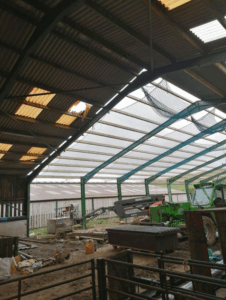Much loved man lost his life ‘due to cost of 50 pence screw’ say family
- Alban Watts died due to a ‘basic and simple’ failure.
- Dangerous parts of machinery had inadequate guarding.
- HSE guidance on working with machinery is available.
The family of a much loved man from Cumbria have spoken of their anger that his life was worth less than “the cost of a 50 pence screw”.
Alban Watts was killed while working for egg producer Bell Mount Farming Limited at its site in Great Salkeld in Penrith on 11 January 2023. The 61-year-old, who lived in the village of Blencow, died after being strangled, when his clothes became entangled in a hen feeding system at the farm.

Speaking after the company was fined £50,000, his brother Martin and sister Louise Robinson spoke of their sadness and anger at his death.
“Losing Alban has taken a part of our trio, without him we are an incomplete unit,” the siblings said.
“Not a day goes by where he is not missed.
“Alban worked at Bell Mount for 12 years and he enjoyed his job. But it’s taken the life of a member of our family for them to do their job.
“We are angry that his life was worth less than a 50p screw to a multi-million pound company. Such a small item could have saved his life. You can’t replace a person who meant so much to us.”

An investigation by the Health and Safety Executive (HSE) found that Bell Mount Farming Limited failed to prevent access to dangerous parts of machinery – in this case the rotating sprocket of the drive mechanism which powered the feeding system in the poultry shed. The system operated for three minute periods at set times throughout the day; the remainder of the time it was motionless.
Mr Watts was working alone in one of the poultry sheds when his clothing came into contact with the unguarded sprocket during one of these feeding periods, causing it to become entangled. The investigation also identified that the guard designed to prevent such access was not fixed in place and could simply be lifted off.
Further examination of the guard identified that the bolt holes in the guard were stripped, preventing it from being secured to the frame of the drive unit. Additionally, these holes in the guard did not align with those in the frame, making it impossible for the guard to be fixed securely.

Alban’s mother Noreen said her son was an accomplished mechanic, joiner and carpenter and that his death had been ‘cruel’.
“Mere words cannot express the horror and distress of hearing such an awful death and I can only hope Alban didn’t suffer,” she said.
“I have now had to go through every parent’s nightmare of surviving their own child, in tragic circumstances.
“Above all, I want lessons to be learnt from this tragedy.
“Due to the lack of a machine guard, my dear son Alban has been killed and taken from me.”
HSE guidance states employers must take effective measures to prevent access to dangerous parts of machinery. This will normally be fixed guards which prevent persons coming into contact with those parts and require a tool to be removed; this was the expected control in this instance. Further guidance can be found here Provision and Use of Work Equipment Regulations 1998 (PUWER) – HSE.
Bell Mount Farming Limited, of Stainton, Penrith, pleaded guilty to breaching Regulation 11(1)(a) of the Provision and Use of Work Equipment Regulations 1998. The company was fined £50,000 and ordered to pay £6,038 in costs at a hearing at Warrington Magistrates’ Court on 20 November 2025.
After the hearing HSE Inspector Matthew Shepherd said: “What is most tragic about this case is the failure of the company was such a basic and simple one.
“What was such an easy fault to fix cost a much loved man his life and left a family without a brother and a son.
“Preventing access to dangerous parts of machinery is a well-known and long-standing part of any health and safety management system.
“Alban’s death shows the importance of ensuring machinery is adequately guarded and the devastating consequences of getting it wrong.
“We will not hesitate to take action against companies which do not do all that they should to keep people safe.”
This HSE prosecution was brought by HSE enforcement lawyer Matthew Reynolds and paralegal officer Farhat Basir.
Further information:
- The Health and Safety Executive (HSE) is Britain’s national regulator for workplace health and safety. We are dedicated to protecting people and places, and helping everyone lead safer and healthier lives.
- More information about the legislation referred to in this case is available.
- Further details on the latest HSE news releases is available.
- Relevant guidance can be found here Provision and Use of Work Equipment Regulations 1998 (PUWER) – HSE
- HSE does not pass sentences, set guidelines or collect any fines imposed. Relevant sentencing guidelines must be followed unless the court is satisfied that it would be contrary to the interests of justice to do so. The sentencing guidelines for health and safety offences can be found here.

